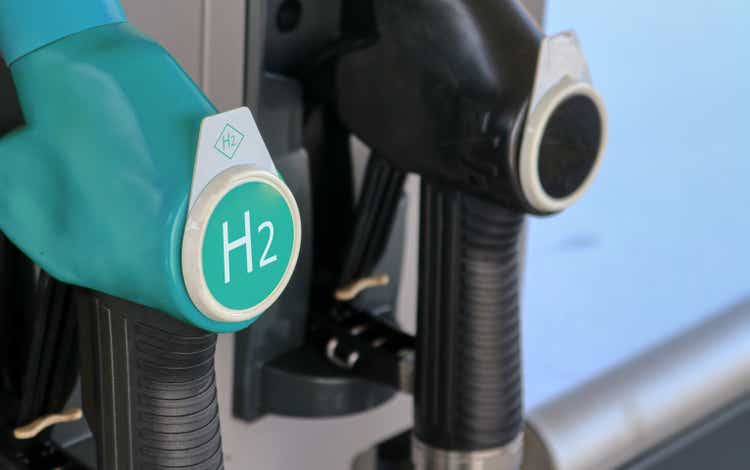No-Mad/iStock via Getty Images
Things were not meant to turn out this way for Hyzon (NASDAQ:HYZN). The Rochester, New York-based fuel-cell truck manufacturer laid out ambitious plans to ride the decarbonization of transport when it went public in the summer of 2021, but common shares have since collapsed on the back of public market investors who dialed the risk-off trade all the way up to dump shares en masse. This has seen the company fall from its go-public pro forma valuation of $2.7 billion to $453 million. Such a material change of fortune mirrors many of its climate economy peers, who also went public via the SPAC phenomenon. These golden days saw cheap stimulus money and low-interest rates drive asset values to stratospheric highs. It is all but dead as inflation spiked, and the Fed hiked rates in response.
Many shareholders have been asking what this means for the company’s mission to decarbonize heavy-duty trucking. This is an industry that consumes 38 billion gallons of diesel fuel each year in the United States and forms one of the fastest-growing sources of carbon emissions as eCommerce continues to boom. Further, the drive to decarbonization has become gospel to both private enterprises and the government. The latter has enacted the Inflation Reduction Act, set to be one of the most instrumental pieces of climate legislation ever, with at least $370 billion being earmarked for decarbonization initiatives to help reduce US greenhouse gas emissions to 50% below 2005 levels by 2030. Indeed, potential customers in the freight space like Deutsche Post AG (OTCPK:DPSTF), Amazon (AMZN), and United Parcel Service (UPS) all have targets to become carbon-neutral by future dates as part of their sustainability commitments. Hyzon’s public listing was meant to tap into this zeitgeist as well as do a few things on a corporate level.
Firstly, it was meant to raise the profile of its fuel cell trucks, which all have decent specifications. For example, the Hyzon Class 8 Freightliner has nearly 500 miles of driving range, a high voltage 110 kWh battery energy, and a 15- minute refueling time. Secondly, it was meant to help the company secure access to funds to bridge expected cash operating expenses and capital expenditures. The company was aiming to raise up to $570 million after expenses at the time it announced its SPAC transaction. This would come from a combination of PIPE funding of $400 million and money left in the trust of its SPAC backer after redemptions.
Hydrogen Fuel Cell-Powered Vehicles: The Future Of Commercial Transportation?
Hyzon’s Craig knight stated that the Nasdaq listing would “foster greater awareness that the future of commercial transportation, hydrogen fuel cell-powered vehicles, is today’s reality.” He is no longer with the company, pushed out two months ago on the back of several failures. The company’s last reported earnings were for its fiscal 2022 first quarter ending in March. The deadline to file the earnings report for its second quarter was missed and has still not been filled even as the third quarter earnings season is underway. This perhaps highlights the seriousness of the issue at hand. Management stated they were made aware of revenue recognition timing issues in China and have appointed a special committee to conduct an independent investigation to address these.
The problems in China were not the only issues flagged as Hyzon identified operational inefficiencies at its European joint venture with Dutch hydrogen company Holthausen. Whilst shareholders would have liked to see these issues clarified and resolved as quickly as possible, the company is yet to either publish the missed earnings report or report back from their investigation. This is an extremely difficult position for its shareholders to be in as Hyzon has received a non-compliance notice from Nasdaq over a failure to yet file its earnings and has up to 180 calendar days, or until Feb. 13, 2023, to regain compliance. Hyzon does hold cash and equivalents of $407.3 million as of the end of its first quarter. The company should have enough liquidity to see it through the turbulence, with a quarterly cash burn of around $30 million.
Hyzon Fights For Its Life
Hyzon set out a bright future where it contributed fully to the decarbonization of transport across the world and made expansion plans from North America to Europe and China to reach this. The company was going to reopen a General Motors (GM) former fuel cell facility in Rochester to produce systems for its trucks, had signed a deal to sell at least 500 of its Hyzon Hymax Series trucks to China, and had set up a European office in the Dutch city of Groningen.
It’s now unclear where these plans are. Such a material failure by management at such an early near formative stage for the company will put off investors and customers indefinitely even when compliance is regained. Fundamentally, the company is to be avoided until this is done.


Be the first to comment